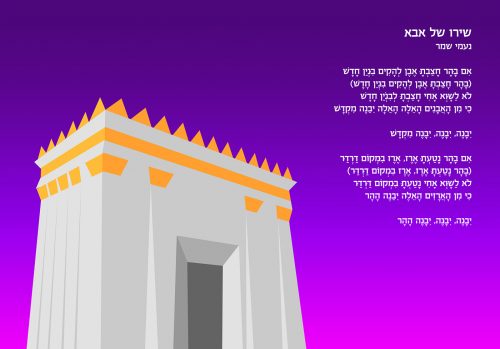A media person and illustrator teamed up for the production of "Haggadat Modi'in" for the secular: expanding on the description of the Exodus from Egypt, Zionist in nature, linking to the return to Zion and the State of Israel, devoid of the mathematics of miracles and combining Hebrew songs and texts by spiritual figures and Jewish leaders

A new secular Haggadah, "Haggadat Modi'in", was published these days. This Haggadah preserves the central message of Passover - coming out of slavery to freedom in the spring season - and refines it through texts and quotations from contemporary thinkers, creators, writers and statesmen. But God's role in this text is very minor. The Haggadah's name was given to it due to its publication in the city of Modi'in, the residence of the author and editor, Uri Katzir; and the workplace of the graphic designer, David Cassirer.
"Contrary to what many believe, the text we read every holiday at the Seder table is not a sacred text," explains Uri Katzir, the author of the Haggadah, "it is a collection of ramblings of clerics from hundreds of years ago, some of which are really not relevant to the reality of our time - and probably were not relevant either. For the reality of their time they are. For example, the bickering over the question of how many blows to the Egyptian line on land and how many on sea - logicless mathematics and an issue that has nothing to do with the liberation message of the main story. The whole thing is nothing but a competition between rabbis as to who will speak more and more in praise of God's power. Passages of this type are not included in the new secular Haggadah.
"Seculars, by definition, do not see God as the center of their world and being," Katzir continues, "therefore, the Haggadah is the story of a people fighting for their liberation against another people, and succeeding in this mission. We believe that liberation from slavery is part of human dynamics and not a matter of mystical intervention by inexplicable forces. We believe that man is responsible for shaping his path in the reality in which he lives and works, and not that someone else - even God - does it for him."
The Modi'in Haggadah is divided into four gates, against the four sons of the traditional Haggadah: the Spring Gate, followed by three gates commemorating three exodus to freedom - the Exodus from Egypt, the return of Zion and Zionism and the State of Israel. In Haggadat Modi'in the message is very clear. It includes Hebrew songs penned by Natan Alterman and Naomi Shemer and Lea Goldberg and Meir Ariel; and texts by Ben Gurion, Jabotinsky, Herzl, Imber, Berel Katznelson - and also by the writer George Eliot. Quotations from the Bible and the traditional Haggadah are also given, if the message implied by them reinforces the main message of the holiday. Thus, not only does the Modi'in Haggadah tell the story of the exodus from Egypt, but it also includes the story of two other national renewals - one, the return of Zion from Babylon; And the other, the era of Zionism and the State of Israel. Because these also represent a departure from slavery to freedom. Thus it turns out that in the traditional Haggadah it is about one exit to freedom, while in the Modi'in Haggadah - about three.
The colorful and clean design of the Haggadah is widely praised. "The guideline was a clean, minimalist and modern design," explains David Cassirer, the designer of the Haggadah, "a design that can stand the test of time and to the extent that it is also innovative and bold, colorful, intriguing and inviting. Dynamic typography was used and the graphic content included references, winks, jokes to those who know Han and various allusions so that even at a second and third glance new things will be revealed to the reader."
The Haggadah is sold through the website . You can also purchase through the association's website.

6 תגובות
good joke
And Naomi was a believing and righteous Jew
May you win too!
Just checking if I can respond
A commendable initiative.
I read the Haggadah every year with my family. And every year we are embarrassed anew by reading the texts, some of which are really stupid.
I have no doubt that I will gradually adopt something new. And this text you suggest seems appropriate in light of the list of sages that appears there: Ben Gurion, Leah Goldberg, Natan Alterman. I hope there is a Parosh Rashi, or at least a Parosh.
As a child, I really liked trying to understand these calculations. That was literally my favorite part. Well, but I'm probably not an example.
A welcome initiative overall, you are completely right about the fact that the legend is not "sacred" in the sense that it must not be changed. Over the years, many changes were made to it without a problem. The main thing is that they talk about freedom and even the exodus from Egypt. According to the title, I already thought it was extreme anti-religious
Successfully.
I personally probably won't buy. I've already gotten too used to the traditional one.
Out of the box.
Ok…
Miracles
I heard you on the radio very nice..
This legend is just for you